
 (732) 246-1377
(732) 246-1377
 (732) 246-1377
(732) 246-1377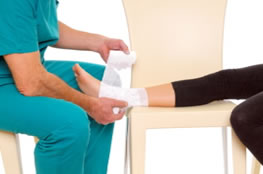 According to Razorbacks coach Bret Bielema, Arkansas linebacker Dre Greenlaw suffered a broken foot, and “will likely miss the rest of the season.” Greenlaw sustained the injury during the 49-30 loss to Alabama. He had to leave the game and he expressed on Twitter that he had to have surgery the following Monday. Greenlaw had to be carted off the field into the locker room, returning on crutches later on. He was replaced by De’Jon Harris for the game.
According to Razorbacks coach Bret Bielema, Arkansas linebacker Dre Greenlaw suffered a broken foot, and “will likely miss the rest of the season.” Greenlaw sustained the injury during the 49-30 loss to Alabama. He had to leave the game and he expressed on Twitter that he had to have surgery the following Monday. Greenlaw had to be carted off the field into the locker room, returning on crutches later on. He was replaced by De’Jon Harris for the game.
A broken foot requires immediate medical attention and treatment. If you need your feet checked, contact one of our podiatrists from Livingston Footcare. Our doctors can provide the care you need to keep you pain-free and on your feet.
Broken Foot Causes, Symptoms, and Treatment
A broken foot is caused by one of the bones in the foot typically breaking when bended, crushed, or stretched beyond its natural capabilities. Usually the location of the fracture indicates how the break occurred, whether it was through an object, fall, or any other type of injury.
Common Symptoms of Broken Feet:
Bruising
Pain
Redness
Swelling
Blue (foot)
Numbness
Cold
Misshapen
Cuts
Deformities
Those that suspect they have a broken foot shoot seek urgent medical attention where a medical professional could diagnose the severity.
Treatment for broken bones varies depending on the cause, severity and location. Some will require the use of splints, casts or crutches while others could even involve surgery to repair the broken bones. Personal care includes the use of ice and keeping the foot stabilized and elevated.
If you have any questions please feel free to contact our office located in North Brunswick, NJ. We offer the newest diagnostic and treatment technologies for all your foot and ankle needs.
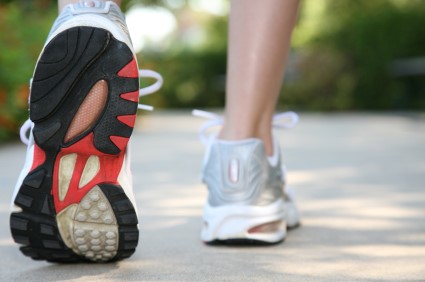 About 79 percent of runners experience some type of foot injury each year. It requires a bit of extra work to keep your feet in top running order, however it is necessary in order to prevent injury. If you want to make your feet less susceptible to injury, you should focus on strengthening your soles. According to Bongiorno,"When your feet are stronger, you'll have better propulsion, which can help you run faster and more efficiently.” You should also be more selective when it comes to buying a new pair of running shoes. Recent studies have shown that minimalist sneakers may be more effective in preventing injury compared to running sneakers with high arches.
About 79 percent of runners experience some type of foot injury each year. It requires a bit of extra work to keep your feet in top running order, however it is necessary in order to prevent injury. If you want to make your feet less susceptible to injury, you should focus on strengthening your soles. According to Bongiorno,"When your feet are stronger, you'll have better propulsion, which can help you run faster and more efficiently.” You should also be more selective when it comes to buying a new pair of running shoes. Recent studies have shown that minimalist sneakers may be more effective in preventing injury compared to running sneakers with high arches.
Exercising your feet regularly with the proper foot wear is a great way to prevent injuries. If you have any concerns about your feet, contact one of our podiatrists from Livingston Footcare. Our doctors can provide the care you need to keep you pain-free and on your feet.
How to Prevent Running Injuries
Many common running injuries are caused by overuse and overtraining. When the back of the kneecap starts wearing out and starts causing pain in your knee, this is commonly referred to as runner’s knee. Runner’s knee is a decrease in strength in your quadriceps and can occur if you’re not wearing properly fitted or supporting shoes. To prevent runner’s knee, focusing on hip strengthening is a good idea, as well as strengthening your quads to keep the kneecaps aligned.
What Are Some Causes of Running Injuries?
- One cause of a common running injury is called iliotibial band syndrome.
- Plantar fasciitis is also another common injury.
- Stress fractures can occur from overtraining, lack of calcium, or even your running style.
Best Ways to Prevent Running Injuries
- Wear footwear that fits properly and suits your running needs.
- Running shoes are the only protective gear that runners have to safeguard them from injury.
- Make a training schedule. Adding strengthening exercises as well as regular stretching can help keep you strong and limber and can lessen the possibility of injuries.
- Stretching keeps muscles limber, this will help you gain better flexibility.
If you have any questions please feel free to contact our office located in North Brunswick, NJ. We offer the newest diagnostic and treatment technologies for all your foot and ankle needs.
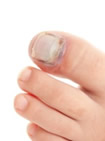 World champion cyclist Wout van Aert recently fell down a flight of stairs, suffering a broken toe. Even with the injury, he still planned on competing in World Cup #2 in Iowa. Team manager Jan Verstraeten stated that little can be done about van Aert’s broken toe, and that he can’t make the injury much worse either. Van Aert planned on testing his toe on the bike in the meantime, and the team will continue to monitor his pain level.
World champion cyclist Wout van Aert recently fell down a flight of stairs, suffering a broken toe. Even with the injury, he still planned on competing in World Cup #2 in Iowa. Team manager Jan Verstraeten stated that little can be done about van Aert’s broken toe, and that he can’t make the injury much worse either. Van Aert planned on testing his toe on the bike in the meantime, and the team will continue to monitor his pain level.
A broken toe can be very painful and lead to complications if not properly fixed. If you have any concerns about your feet, contact one of our podiatrists from Livingston Footcare. Our doctors can provide the care you need to keep you pain-free and on your feet.
What to Know About a Broken Toe
Although most people try to avoid foot trauma such as banging, stubbing, or dropping heavy objects on their feet, the unfortunate fact is that it is a common occurrence. Given the fact that toes are positioned in front of the feet, they typically sustain the brunt of such trauma. When trauma occurs to a toe, the result can be a painful break (fracture).
Symptoms of a Broken Toe
· throbbing pain
· swelling
· bruising on the skin and toenail
· the inability to move the toe
· toe appears crooked or disfigured
· tingling or numbness in the toe
Generally, it is best to stay off of the injured toe with the affected foot elevated.
Severe toe fractures may be treated with a splint, cast, and in some cases, minor surgery. Due to its position and the pressure it endures with daily activity, future complications can occur if the big toe is not properly treated.
If you have any questions please feel free to contact one of our offices located in North Brunswick, NJ. We offer the newest diagnostic and treatment technologies for all your foot and ankle needs.
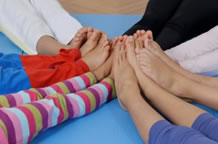 Your foot care routine should include washing and drying your feet thoroughly each day. Moisturizer should also be used in order to keep your feet soft, however it should not be used in between the toes. Pedicures can also be very beneficial, but there are certain things you should look out for before you go to the nail salon. For example, whirlpool soaks that many salons tend to use are havens for bacteria growth. You should also make sure that the salon you go to sterilizes all of their equipment. Another thing to be cautious of is sharp debridement. Sharp blades and razors should never be used on the skin of your feet.
Your foot care routine should include washing and drying your feet thoroughly each day. Moisturizer should also be used in order to keep your feet soft, however it should not be used in between the toes. Pedicures can also be very beneficial, but there are certain things you should look out for before you go to the nail salon. For example, whirlpool soaks that many salons tend to use are havens for bacteria growth. You should also make sure that the salon you go to sterilizes all of their equipment. Another thing to be cautious of is sharp debridement. Sharp blades and razors should never be used on the skin of your feet.
Every day foot care is very important to prevent infection and other foot ailments. If you need your feet checked contact one of our podiatrists from Livingston Footcare. Our doctors can provide the care you need to keep you pain-free and on your feet.
Every Day Foot Care
Often, people take care of their bodies, face and hair more so than they do for their feet. But the feet are a very important aspect of our bodies, and one that we should pay more attention to. After all, without our feet, we would not be able to perform most daily tasks. It is best to check your feet regularly to make sure there are no new bruises or cuts that you may not have noticed before, for example.
For dry feet, moisturizer can easily be a remedy and can be applied as often as necessary to the affected areas. Wearing shoes that fit well can also help you maintain good foot health, as well as making it easier to walk and do daily activities without the stress or pain of ill-fitting shoes, high heels, or even flip flops.
Also, wearing clean socks with closed shoes is important to ensure that sweat and bacteria do not accumulate within the shoe. Clean socks help to prevent athlete’s foot, fungi problems, bad odors, and can absorb sweat.
If you have any questions please feel free to contact one of our offices located in North Brunswick, NJ. We offer the newest diagnostic and treatment technologies for all your foot and ankle needs.
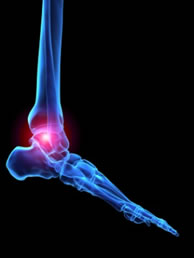 Rheumatoid arthritis can be described as an inflammatory disease that manifests in the body’s joints, a disease that can lead to “disability, loss of quality of life, reduced ability to work and increased health care utilization.” According to Medscape, rheumatoid arthritis is “the most common and most important of the inflammatory rheumatic diseases, with a prevalence of ~1% of the population worldwide, estimated to increase by ~22% between 2005 and 2025 due to the ageing population.” See your doctor for early diagnosis, as prevention is vital to ensuring that the disease does not progress.
Rheumatoid arthritis can be described as an inflammatory disease that manifests in the body’s joints, a disease that can lead to “disability, loss of quality of life, reduced ability to work and increased health care utilization.” According to Medscape, rheumatoid arthritis is “the most common and most important of the inflammatory rheumatic diseases, with a prevalence of ~1% of the population worldwide, estimated to increase by ~22% between 2005 and 2025 due to the ageing population.” See your doctor for early diagnosis, as prevention is vital to ensuring that the disease does not progress.
Because RA affects more than just your joints, including the joints in your feet and ankles, it is important to seek early diagnosis from your podiatrist if you feel like the pain in your feet might be caused by RA. For more information,contact one of our podiatrists from Livingston Footcare. Our doctors can provide the care you need to keep your pain free and on your feet.
What Is Rheumatoid Arthritis?
Rheumatoid Arthritis (RA) is an autoimmune disorder in which the body’s own immune system attacks the membranes surrounding the joints. Inflammation of the lining and eventually the destruction of the joint’s cartilage and bone occur, causing severe pain and immobility.
Rheumatoid Arthritis of the Feet
Although RA usually attacks multiple bones and joints throughout the entire body, almost 90 percent of cases result in pain in the foot or ankle area.
Symptoms
- Swelling & pain in the feet
- Stiffness in the feet
- Pain on the ball or sole of feet
- Joint shift and deformation
Diagnosis
Quick diagnosis of RA in the feet is important so that the podiatrist can treat the area effectively. Your doctor will ask you about your medical history, occupation, and lifestyle to determine the origin of the condition. Rheumatoid Factor tests help to determine if someone is affected by the disease.
If you have any questions, please feel free to contact our offices located in North Brunswick, NJ. We offer the newest diagnostic and treatment technologies for all your foot care needs.
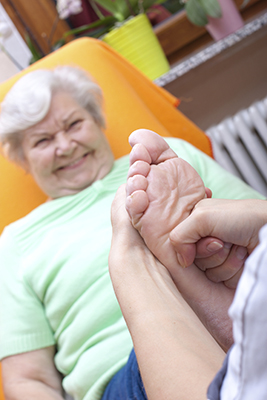 Diabetes UK has recent released a diabetes guide to prevent diabetes-related amputations, as numbers have reached an all-time high in England. Diabetes-related amputations occur most commonly in the lower leg, such as the toes and foot area. According to Public Health England, “data suggests there are about 20 amputations carried out a day and experts estimate believe that four out of five could be prevented because 80 per cent are normally preceded by a foot ulcer.” Taking care of your feet and having analyses done by doctors are both vital toward ensuring the prevention of diabetes-related amputations.
Diabetes UK has recent released a diabetes guide to prevent diabetes-related amputations, as numbers have reached an all-time high in England. Diabetes-related amputations occur most commonly in the lower leg, such as the toes and foot area. According to Public Health England, “data suggests there are about 20 amputations carried out a day and experts estimate believe that four out of five could be prevented because 80 per cent are normally preceded by a foot ulcer.” Taking care of your feet and having analyses done by doctors are both vital toward ensuring the prevention of diabetes-related amputations.
Diabetic foot care is important in preventing foot ailments such as ulcers. If you are suffering from diabetes or have any other concerns about your feet, contact one of our podiatrists from Livingston Footcare. Our doctors can provide the care you need to keep your pain free and on your feet.
Diabetic Foot Care
Diabetes affects millions of people every year. Diabetes can damage blood vessels in many parts of the body, including the feet. Because of this, taking care of your feet is essential if you have diabetes, and having a podiatrist help monitor your foot health is highly recommended.
The Importance of Caring for Your Feet
● Routinely inspect your feet for bruises or sores.
● Wear socks that fit your feet comfortably.
● Wear comfortable shoes that provide adequate support.
Patients with diabetes should have their doctor monitor their blood levels because blood sugar levels play such a huge role in diabetic care. Monitoring these levels on a regular basis is highly advised.
It is always best to inform your healthcare professional of any concerns you may have regarding your feet, especially for diabetic patients. Early treatment and routine foot examinations are keys to maintaining proper health, especially because severe complications can arise if proper treatment is not applied.
If you have any questions please feel free to contact one of our offices located in North Brunswick, NJ. We offer the newest diagnostic and treatment technologies for all your foot and ankle needs.
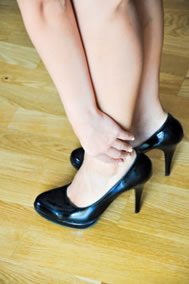 A study published by the Journal of Applied Physiology has determined that long-term high heel use can have detrimental effects on the legs’ muscles, such as muscle strain and muscle fatigue. According to the study’s abstract, long-term high heel use has been found to “shorten medial gastrocnemius muscle fascicles and increase Achilles tendon stiffness.” The study’s results are consistent with reports that high heel wearers often experience discomfort, pain, and tiredness. It also suggests that “long-term high heel use may compromise muscle efficiency in walking.”
A study published by the Journal of Applied Physiology has determined that long-term high heel use can have detrimental effects on the legs’ muscles, such as muscle strain and muscle fatigue. According to the study’s abstract, long-term high heel use has been found to “shorten medial gastrocnemius muscle fascicles and increase Achilles tendon stiffness.” The study’s results are consistent with reports that high heel wearers often experience discomfort, pain, and tiredness. It also suggests that “long-term high heel use may compromise muscle efficiency in walking.”
High heels have a history of causing foot and ankle problems. If you have any concerns about your feet or ankles, contact one of our podiatrists from Livingston Footcare. Our doctors can provide the care you need to keep you pain-free and on your feet.
Effects of High Heels on the Feet
High heels are popular shoes among women because their style and societal appeal. Despite this, they can still cause many health problems if worn too frequently.
What parts my body will be affected by high heels?
Ankle Joints
Achilles Tendon – may shorten and stiffen with prolonged wear
Balls of the Feet
Knees – heels cause the knees to bend constantly, creating stress on them
Back – they decrease the spine’s ability to absorb shock, which may lead to back pain. Also, the vertebrae of the lower back may compress.
What kinds of foot problems can develop from wearing high heels?
Corns
Calluses
Hammertoe
Bunions
Morton’s Neuroma
Plantar Fasciitis
How can I still wear high heels and maintain foot health?
If you want to wear high heeled shoes, make sure that you are not wearing them every day, as this will help prevent long term physical problems. Try wearing thicker heels as opposed to stilettos to distribute weight more evenly across the feet. Always make sure you are wearing the proper shoes for the right occasion, such as sneakers for exercising. If you walk to work, try carrying your heels with you and changing into them once you arrive at work. Adding inserts to your heels can help cushion your feet and absorb shock. Full foot inserts or metatarsal pads are available.
If you have any questions please feel free to contact our offices located in North Brunswick, NJ. We offer the newest diagnostic tools and technology to treat your foot and ankle needs.
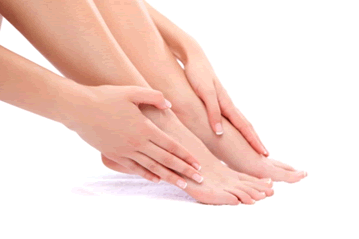 Plantar fasciitis is the most common foot condition that patients go to a podiatrist to seek help for. Plantar fasciitis occurs when the ligament in the arch of the foot becomes inflamed; this is usually caused by overuse. Many people who struggle with the condition are able to treat it with ease. There are over-the-counter solutions geared toward treating people with plantar fasciitis. Some of these solutions include arch supports and anti-inflammatory medications.
Plantar fasciitis is the most common foot condition that patients go to a podiatrist to seek help for. Plantar fasciitis occurs when the ligament in the arch of the foot becomes inflamed; this is usually caused by overuse. Many people who struggle with the condition are able to treat it with ease. There are over-the-counter solutions geared toward treating people with plantar fasciitis. Some of these solutions include arch supports and anti-inflammatory medications.
Plantar fasciitis can be very painful and inconvenient. If you are experiencing heel pain or symptoms of plantar fasciitis, contact one of our podiatrists from Livingston Footcare. Our doctors can provide the care you need to keep your pain free and on your feet.
What is Plantar Fasciitis?
Plantar fasciitis is the inflammation of the thick band of tissue that runs along the bottom of your foot, known as the plantar fascia, and causes mild to severe heel pain.
What Causes Plantar Fasciitis?
· Excessive running
· Non-supportive shoes
· Overpronation
· Repeated stretching and tearing of the plantar fascia
How Can It Be Treated?
· Conservative measures – anti-inflammatories, ice packs, stretching exercises, physical therapy, orthotic devices
· Shockwave therapy – sound waves are sent to the affected area to facilitate healing and are usually used for chronic cases of plantar fasciitis
· Surgery – usually only used as a last resort when all else fails. The plantar fascia can be surgically detached from the heel
While very treatable, plantar fasciitis is definitely not something that should be ignored. Especially in severe cases, speaking to your doctor right away is highly recommended to avoid complications and severe heel pain. Your podiatrist can work with you to provide the appropriate treatment options tailored to your condition.
If you have any questions please feel free to contact our office located in in North Brunswick, NJ. We offer the newest diagnostic tools and technology to treat your foot and ankle needs.
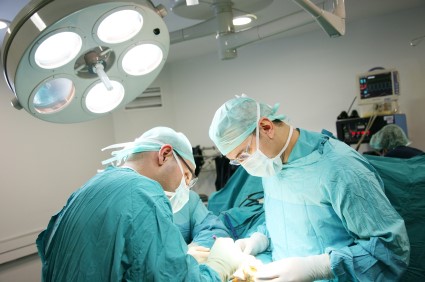 Italian footballer Rolando Mandragora recently underwent surgery on a metatarsal injury. The surgery aimed to reduce the synthesis of the fifth metatarsal in his left foot. The surgeon who performed the operation announced that everything was successful and that Mandragora can start rehabilitation soon. However, he isn’t expected to make a return until about three or four months.
Italian footballer Rolando Mandragora recently underwent surgery on a metatarsal injury. The surgery aimed to reduce the synthesis of the fifth metatarsal in his left foot. The surgeon who performed the operation announced that everything was successful and that Mandragora can start rehabilitation soon. However, he isn’t expected to make a return until about three or four months.
Foot surgery is sometimes necessary to fix a foot ailment. To learn more, contact one of our podiatrists from Livingston Footcare. Our doctors can provide the care you need to keep you pain-free and on your feet.
When Is Surgery Necessary?
Foot and ankle surgery is generally reserved for cases in which less invasive, conservative procedures have failed to help with the problem. Some of the cases in which surgery may be necessary are:
● Removing foot deformities like bone spurs and bunions
● Severe arthritis that has caused bone issues
● Cosmetic reconstruction
What Types of Surgery Are There?
The type of surgery you receive will depend on the nature of the problem you have. Some of the possible surgeries include:
● Bunionectomy for painful bunions
● Surgical fusion for realignment of bones
● Neuropathy decompression surgery to treat nerve damage
Benefits of Surgery
Although surgery is usually a last resort, it can provide more complete pain relief compared to non-surgical methods and may allow you to finally resume full activity.
Surgical techniques have also become increasingly sophisticated. Techniques like endoscopic surgery allow for smaller incisions and faster recovery times.
If you have any questions please feel free to contact our office located in North Brunswick, NJ. We offer the newest diagnostic and treatment technologies for all your foot and ankle needs.
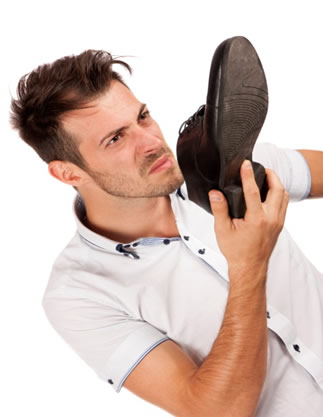 There are home remedies that can be used to treat sweating of the feet. Applying talcum powder, or soaking your feet in saltwater or vinegar can help stop your feet from sweating. However, a company called Carpe Lotion has released a product that can treat the smell that sweat produces. People with hyperhidrosis, or excessive sweating, use the product twice a day every day in order to treat the condition..
There are home remedies that can be used to treat sweating of the feet. Applying talcum powder, or soaking your feet in saltwater or vinegar can help stop your feet from sweating. However, a company called Carpe Lotion has released a product that can treat the smell that sweat produces. People with hyperhidrosis, or excessive sweating, use the product twice a day every day in order to treat the condition..
If you have any concerns about your feet or ankles contact one of our podiatrists from Livingston Footcare. Our doctors will treat your foot and ankle needs.
Hyperhidrosis of the Feet
Hyperhidrosis is a rare disorder that can cause people to have excessive sweating of their feet. This can usually occur all on its own without rigorous activity involved. People who suffer from hyperhidrosis may also experience sweaty palms.
Although it is said that sweating is a healthy process meant to cool down the body temperature and to maintain a proper internal temperature, hyperhidrosis may prove to be a huge hindrance on a person’s everyday life.
Plantar hyperhidrosis is considered to be the main form of hyperhidrosis. Secondary hyperhidrosis can refer to sweating that occurs in areas other than the feet or hands and armpits. Often this may be a sign of it being related to another medical condition such as menopause, hyperthyroidism and even Parkinson’s disease.
In order to alleviate this condition, it is important to see your doctor so that they may prescribe the necessary medications so that you can begin to live a normal life again. If this is left untreated, it is said that it will persist throughout an individual’s life.
A last resort approach would be surgery, but it is best to speak with your doctor to find out what may be the best treatment for you.
If you have any questions, please feel free to contact our office in North Brunswick, NJ. We offer the newest diagnostic and treatment technologies for all your foot care needs.
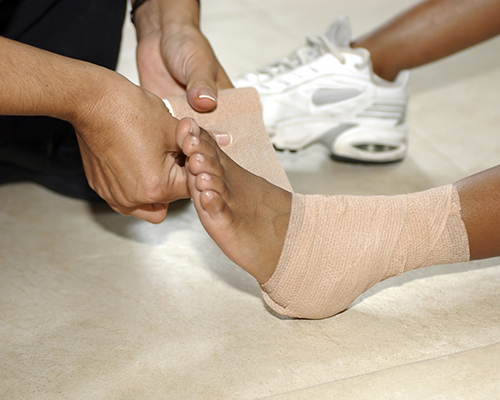 Approximately 28,000 people sprain their ankle in the United States each day. About 55% of those people who sprain their ankle never go to a doctor to seek treatment for their injury. Consequently, a lot of these untreated ankle sprains will recur in the future because they haven’t been properly treated. Ankle sprains tend to be most common among active people, but they can also be caused by walking on uneven surfaces or tripping on a flight of stairs. It is very important to not ignore an ankle sprain, because it could be a much more serious injury than you expect.
Approximately 28,000 people sprain their ankle in the United States each day. About 55% of those people who sprain their ankle never go to a doctor to seek treatment for their injury. Consequently, a lot of these untreated ankle sprains will recur in the future because they haven’t been properly treated. Ankle sprains tend to be most common among active people, but they can also be caused by walking on uneven surfaces or tripping on a flight of stairs. It is very important to not ignore an ankle sprain, because it could be a much more serious injury than you expect.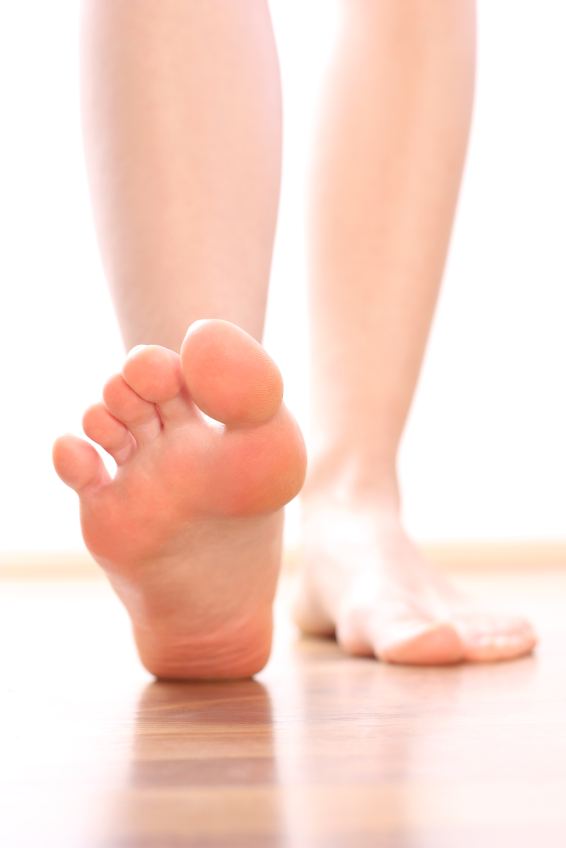 Plantar warts develop on the bottom of our feet as round growths on the skin, described as having brown dots. Warts are caused by the papillomavirus and usually go away on their own, typically not requiring any treatment. Avoid picking at the wart to prevent infection. A potential option for treating your wart is by covering it up with tape, as “warts deprived of air and sun exposure sometimes die without the need for topical treatments.”
Plantar warts develop on the bottom of our feet as round growths on the skin, described as having brown dots. Warts are caused by the papillomavirus and usually go away on their own, typically not requiring any treatment. Avoid picking at the wart to prevent infection. A potential option for treating your wart is by covering it up with tape, as “warts deprived of air and sun exposure sometimes die without the need for topical treatments.”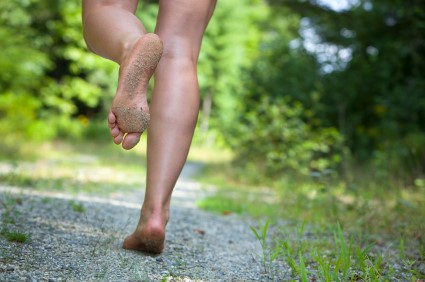 Although shoes were created in order to protect our feet, humans were made to run barefoot. Researchers believe that barefoot running is more efficient than running with shoes. Barefoot running improves running posture and helps fight pronation. Although barefoot running provides a lot of benefits, shoes have become a necessity in our society due to the fact that they protect us from disease.
Although shoes were created in order to protect our feet, humans were made to run barefoot. Researchers believe that barefoot running is more efficient than running with shoes. Barefoot running improves running posture and helps fight pronation. Although barefoot running provides a lot of benefits, shoes have become a necessity in our society due to the fact that they protect us from disease.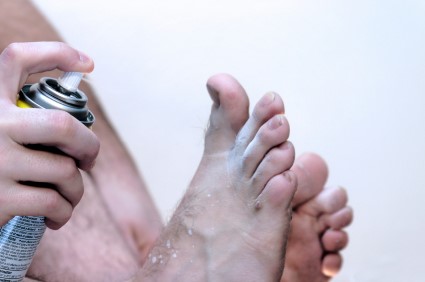 Athlete’s foot can be very problematic for people who suffer from it. It is an itchy and painful fungal infection, but there are preventative measures you can take to avoid getting it. In order to protect your feet from athlete’s foot, you should use soap and water to wash your feet daily. When you finish washing your feet, it is important to dry them thoroughly, especially between the toes. Furthermore, you should always wear sandals in public locker rooms and restrooms in order to protect your feet from fungus. Lastly, you should try to wear shoes that are lightweight and breathable in order to maintain healthy feet.
Athlete’s foot can be very problematic for people who suffer from it. It is an itchy and painful fungal infection, but there are preventative measures you can take to avoid getting it. In order to protect your feet from athlete’s foot, you should use soap and water to wash your feet daily. When you finish washing your feet, it is important to dry them thoroughly, especially between the toes. Furthermore, you should always wear sandals in public locker rooms and restrooms in order to protect your feet from fungus. Lastly, you should try to wear shoes that are lightweight and breathable in order to maintain healthy feet.